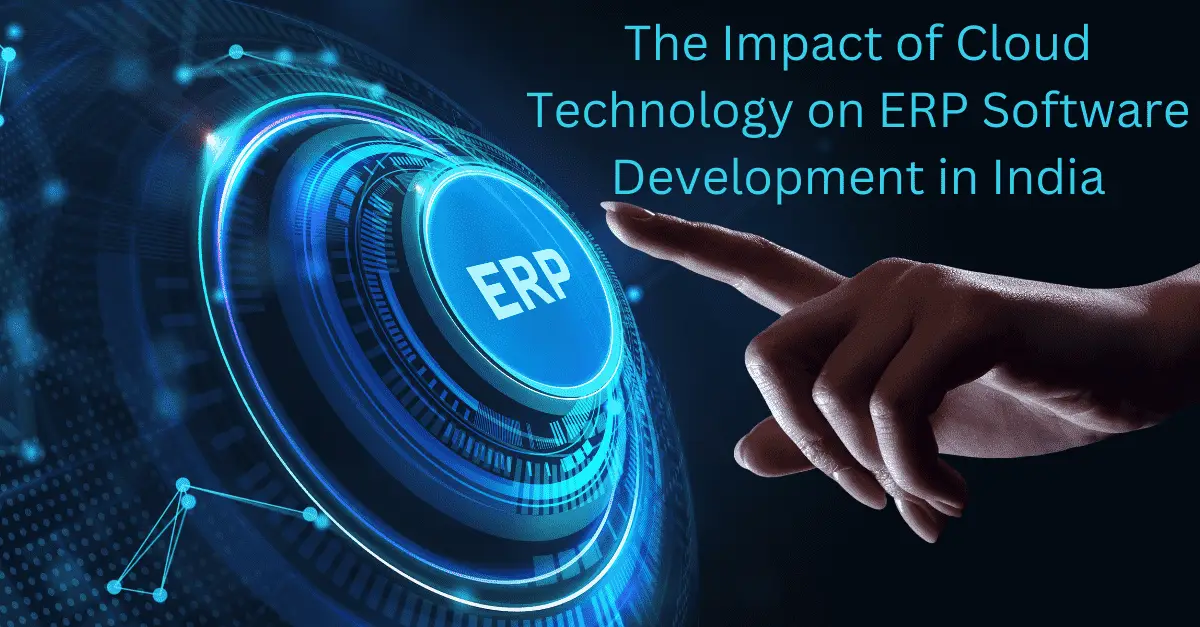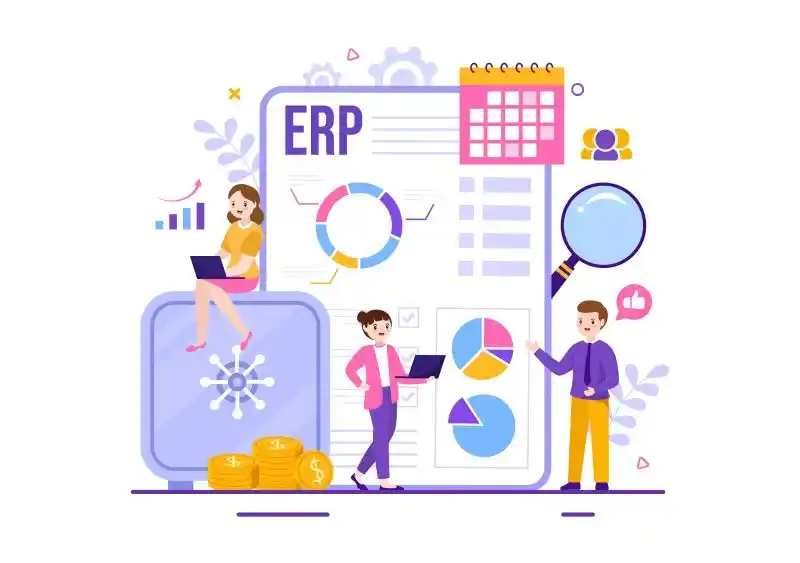The Impact of Cloud Technology on ERP Software Development in India
With the advent of cloud computing, India has entered a new era of revolutionary enterprise resource planning (ERP) software development. We successfully traverse the ever-changing terrain created by the combination of cloud innovation with ERP solutions as an ERP software development company in India. Because of its scalability, accessibility, and cost-efficiency, cloud technology has become the backbone of contemporary enterprise resource planning (ERP) development.
In this investigation, we expose the paradigm change that cloud computing brings to ERP systems by revealing its many effects. Come along as we reveal the unfolding story of ERP development, highlighting the trailblazing IT firms in India that are developing ERP systems to help businesses optimize their operations and stay ahead of the curve.
Evolution of Cloud ERP Software in India
Ever since their debut, ERP systems have advanced significantly. They were first created to combine different company activities and expedite processes, but as technology has advanced and the business environment has changed, they have experienced a substantial transformation.
One of the most recent innovations, cloud ERP makes use of cloud computing’s capacity to provide enterprises with unmatched flexibility, scalability, and affordability.
Conventional ERP systems are usually installed on-premises and provide several issues, such as expensive setup, intricate upkeep, and constrained scalability. However, cloud computing offers a different approach, changing the ERP landscape and resolving these issues.
Understanding of the Cloud Technology in ERP Software
- On-Demand Service: Customers do not need to make an upfront investment in hardware or infrastructure since they may acquire computer resources on demand and just pay for what they use.
- Scalability: Scalability is a feature of cloud services that let customers effortlessly scale resources up or down in response to demand, guaranteeing best practices and cost-effectiveness.
- Resource Pooling: To maximize infrastructure usage and enable effective resource use, cloud providers pool and distribute resources across several users.
- Broad Network Access: Users may access computer resources anywhere at any time via cloud services, which are available over the internet from any device with an internet connection.
- Managed Services: Cloud providers relieve customers of the hassle of maintaining hardware and software infrastructure by providing managed services, such as security, upgrades, and maintenance.
- Pay-Per-Use Pricing Model: Cloud services typically operate on a pay-per-use pricing model, where users are charged based on the resources they consume, offering cost-effective solutions for businesses of all sizes.
- Service Models: Cloud computing provides a range of service models, with varying degrees of abstraction and administration responsibilities. These models include Infrastructure as a Service (IaaS), Platform as a Service (PaaS), and Software as a Service (SaaS).
- Deployment Models: The public, private, hybrid, and multi-cloud cloud computing deployment types provide flexibility in allocating and managing resources according to business needs and legal compliance.
How cloud technology has revolutionized ERP software development?
The development of ERP software has revolutionized the use of cloud technologies, changing how companies run and allocate their resources. Due to cloud-based bespoke ERP software development services, businesses may now get fully customized solutions that address their specific requirements and difficulties.
ERP solutions are now easier to use, more scalable, and more agile than ever thanks to cloud technologies. Companies may now easily implement, operate, and grow their ERP systems by using the cloud’s capabilities rather than incurring the high costs associated with on-premises equipment.
ERP development services may make use of cloud platforms’ flexibility to provide real-time information, optimize workflows, and improve departmental and geographical cooperation. In addition, cloud-based ERP systems are more affordable, dependable, and secure, which makes them a great option for companies trying to remain competitive in today’s market.
Cloud ERP Software Market Stats and Facts
The emergence of cloud computing has led to significant industrial transformations, one of which is the bespoke enterprise software development sector. The following figures illustrate the effect that the introduction of cloud ERP systems has had:

- In 2021, cloud computing produced $400 billion in revenue.
- It is anticipated that end-user expenditure on public clouds will surpass $232 billion by 2024.
- In 2022, the worldwide IT expenditure amounted to $4.4 trillion. Enterprise software development costs $856 billion in total.
- By 2025, the worldwide ERP market will generate over $100 billion in sales.
- The military and aerospace, retail, and government utility industries are driving the expansion of the ERP industry.
- After putting ERP systems into place, 95% of organizations saw improvements.
- The three main business objectives of using cloud-based ERP systems are cost reduction, enhanced performance, and increased transaction efficiency.
Benefits of Cloud-Based ERP Systems
1- Easy system maintenance: Upgrades and maintenance of on-premises ERP systems need a lot of work. Also, it might temporarily disrupt company procedures. Service providers update cloud-based ERP systems automatically. Software upgrades, feature expansions, and security fixes are installed in the background or during idle hours to minimize disruption.
2- Effortless Implementation: Businesses don’t need to choose gear, install it, onboard and educate IT workers, run security checks, etc.
The cloud-based ERP service provider handles all implementation details so you may use the system straight immediately.
3- Flexible Integration: Most cloud ERP systems interact well with other cloud services. Due of the plethora of prebuilt connectors, APIs, and interface protocols.
4- Rapid Scaling: Quick scalability is a major advantage of cloud-based ERP solutions. This prevents performance issues in the event of a sudden spike or dip in users.
This allows you to flexibly optimize operational expenses and scale up or down based on changing demands.
5- Vendor support: Cloud ERP service providers are accessible around the clock, every day of the year, regardless of your time zone. Maintenance and updates cause downtime of less than 0.01%. Your in-house IT department won’t have to work as hard because of it.
Potential challenges in migrating to cloud-based ERP systems
Although there are many advantages to moving to ERP systems on the cloud, there are also certain difficulties to be aware of. Because of our position as a top ERP software development company in India, we are familiar with these challenges and their solutions. Consider the following possible obstacles:
- Data Security Concerns: Data security is an issue when transferring sensitive information to the cloud. Strong security measures must be put in place to prevent data breaches and unauthorized access.
- Integration Complexity: It could be difficult to integrate preexisting systems with ERP solutions hosted in the cloud. Thorough preparation and execution are necessary to overcome potential compatibility concerns and data transfer obstacles.
- Customization Requirements: Not every business may be adequately served by off-the-shelf cloud ERP systems. A more involved migration procedure could be required if customization is to be considered.
- User Adoption: User training and assistance are essential throughout an ERP system transition. Lack of familiarity with the new system and reluctance to adapt might impede its adoption and productivity.
- Performance and Reliability: System responsiveness and dependability might be affected by reliance on internet connection and the performance of cloud service providers; hence, backup plans should be prepared in case of outages.
- Cost Management: Although cloud-based ERP systems may save money in the long term, it is important to carefully manage the migration expenses and subscription fees up front to make sure it’s worth it.
- Regulatory Compliance: When transferring sensitive information to the cloud, it is crucial to adhere to data protection rules and industry standards. Especially in sectors with a lot of rules and regulations, maintaining compliance may be difficult.
Conclusion:
There has been a revolutionary shift in ERP software development in India due to the advent of cloud computing. Cloudmonte Technologies has seen the cloud’s revolutionary impact on the business firsthand as one of the top ERP software development companies. Businesses can simplify operations, boost efficiency, and drive development with cloud-based ERP systems. These solutions provide unrivaled flexibility, scalability, and accessibility.
Using our knowledge of ERP development, Cloudmonte Technologies is devoted to assisting companies in realizing their objectives via the use of cloud technology. Our specialized solutions and extensive expertise in the field can help businesses conquer the obstacles of cloud-based ERP system migration and realize the full promise of today’s technology.
Looking forward, Cloudmonte Technologies continues to lead the way in ERP software development in India. We are committed to meeting our customers’ changing demands via constant innovation and adaptation. If we work together, we can take advantage of cloud computing’s benefits and thrive in the modern Internet era.





